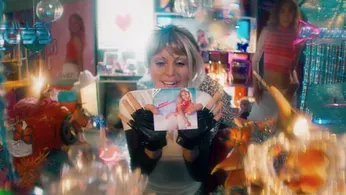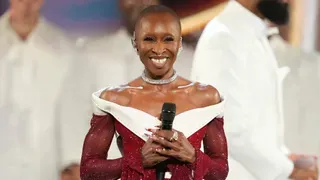
Apr 17
Review: Alexis Langlois' Debut 'Queens of Drama' is Full of Queer Kinetic, Hyperactive Energy
C.J. Prince READ TIME: 3 MIN.
Alexis Langlois' debut feature "Queens of Drama" opens in 2055, where aging vlogger SteevyShady (real-life singer and YouTuber Bilal Hassani) introduces us to the tragic, musical love story about to unfold through their own YouTube-esque video. It has the usual trademarks of influencer videos like jump cuts and a brash personality in center frame, along with being unabashedly queer; SteevyShady's introduction includes them telling right-wingers to "get lost" as this video isn't for them. Despite taking place decades before and after 2025, "Queens of Drama" has a kinetic, hyperactive energy that feels of the moment, especially for those spending their days consuming as much pop culture as they can online.
At least that's how Langlois' film operates on a stylistic level. Every frame has something with a shimmer or glimmer in it, the whole thing takes place on colorful sound stages with bold lighting, and every aspect is so heightened the film could leave the exosphere at any moment. "Queens of Drama" takes camp, melodrama, and artifice as far as its modest budget can go while taking inspiration from pop culture hallmarks between the 80s and 2000s. It's a film full of glitter and pizazz that's too caught up in itself to ever let viewers in on the fun.
The central love story begins in 2005, when young, aspiring musicians Mimi Madamour (Louiza Aura) and Billie Kohler (Billie Kolher) meet at an audition for an "American Idol" type of singing competition and instantly fall for each other even if they have opposite lives. Mimi wants to be a main pop girl against her mother's wishes ("She sees me as Maria Callas when I'm clearly Mariah Carey," she says early on in one example of the film's zingers) while Billie is an out lesbian punk in a hardcore band with her friend. Unsurprisingly, Billie's rage against the patriarchy attitude gets her laughed out of the room during her audition, while Mimi's feminine, mainstream sensibilities move her forward to the point of winning the show. Their love for each other remains as intense as ever, but Mimi's success requires her to stay in the closet and keep Billie hidden, making their romance impossible.
Narratively speaking, "Queens of Drama" isn't doing much more than a riff on "A Star is Born," and the relative safeness of the story clashes against its audacious style. In interviews for the film, Langlois mentions the political aspect of his film in how people from the queer community haven't been allowed to see themselves represented in these kinds of stories before. Much of "Queens of Drama" plays out with the sense of Langlois and his queer friends giddily hijacking this classic kind of love story for themselves so they can have Billie and Mimi sing a duet about fisting "up to each other's hearts." And while there's some fun in the rebellious act, the concept of placing queer characters into this story dominates the film to the point of sucking out any value or emotional investment in the story. With so much effort put into the film's in-your-face attitude, it's unfortunate to see the narrative foundation treated as an afterthought.
Lucky for Langlois, the surface pleasures of "Queens of Drama" keep his film moving along. The charming score has its highlights, including Mimi's breakout hit "Pas touche" that manages to be a genuine earworm. The ensemble cast's commitment helps too, with Gio Ventura giving such an assured performance it's hard to believe it's his first feature role. "Queens of Drama" should hopefully find its audience as more people get to see it and, hopefully, see something of themselves in the film. But representation can only go so far, and its modest handling of such a rote narrative makes much of its transgressive qualities ring hollow.







